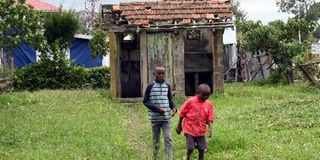Toilets are a ticket to dignity and health

Children play near a dilapidated toilet. Kenya committed itself to ending open defecation by 2020. FILE PHOTO | NATION MEDIA GROUP
What you need to know:
- In many parts of the country, open defecation poses serious health concerns, such as cholera outbreaks.
- On World Toilet Day, we renew our commitment to support the government to realise the tremendous health benefits, economic opportunities and — most importantly — the human dignity, which proper sanitation provides.
When nature calls, we need a toilet. However, in Kenya, there are 5.6 million people — 12 per cent of the population — who do not have access to one. There are significant disparities in the availability and access to proper sanitation — with 15 per cent of people in the rural areas defecating in the open compared to three per cent in urban centres.
PRODUCTIVITY
This means that human faeces are not being safely disposed of on a massive scale. In many parts of the country, open defecation poses serious health concerns, such as cholera outbreaks. Poor sanitation also has broad impacts beyond public health, including living and working conditions, nutrition and economic productivity. It also affects girls’ education. In schools where there are neither safe nor private toilets, girls often drop out. Every year on November 19, World Toilet Day places sanitation at the centre of the development agenda. It is about dignity, gender equality and safeguarding our health and well-being.
LATRINES
Kenya has adopted the Sustainable Development Goals. SDG 6 aims at ensuring that open defecation is eliminated by 2030. Kenya committed itself to ending open defecation by 2020. This requires county governments to plan how to support households and communities to invest in latrines and hand washing facilities.
SANITATION
Some counties have already made remarkable progress. Busia and Kitui have been declared open-defecation free, while Siaya and Isiolo are nearing the finish line.
Isiolo County began its journey in 2016. Then, 44 per cent of its 143,000 people practised open defecation. A 2014 World Bank analysis estimated Isiolo to be losing Sh139 million in revenue annually due to poor sanitation, mostly attributed to health care expenses and lost wages.
COMMUNITY
Since 2016, Isiolo County and Unicef have invested resources for public health officers, community health workers and volunteers to engage with communities and households about the spread of disease-causing germs from exposed human faeces.
Increased awareness of the link between disease outbreaks and open defecation from the lack of latrines and poor hygiene is leading to action. Today, 154 of the 263 villages in Isiolo are free of open defecation, meaning all households have a latrine and a hand washing facility with water and soap. Isiolo hopes to eliminate open defecation by March.
SH30,000
For every dollar invested in sanitation, $5.5 is returned as savings derived from communities needing less health care, travelling less to clinics and missing less work due to illness. With a price tag of Sh30,000 per village, dedicated teams of health workers engage communities in promoting the uptake and usage of proper sanitation and hygiene. This saves lives, restores dignity and reaps economic returns. We call upon other counties to push for progress in providing access to safe toilets for every household.
On World Toilet Day, we renew our commitment to support the government to realise the tremendous health benefits, economic opportunities and — most importantly — the human dignity, which proper sanitation provides.
Dr Kuti is the governor of Isiolo and Mr Schultink, the representative of Unicef in Kenya.




